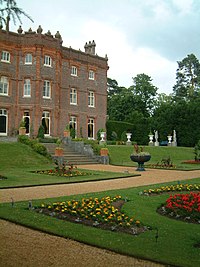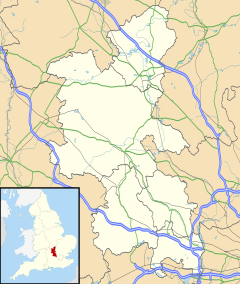| Hughenden Valley | |
|---|---|
 The rear of Hughenden Manor | |
Location within Buckinghamshire | |
| Population | 8,362 (2011)[1] |
| OS grid reference | SU866972 |
| Civil parish |
|
| Unitary authority | |
| Ceremonial county | |
| Region | |
| Country | England |
| Sovereign state | United Kingdom |
| Post town | HIGH WYCOMBE |
| Postcode district | HP14, HP15 |
| Dialling code | 01494 |
| Police | Thames Valley |
| Fire | Buckinghamshire |
| Ambulance | South Central |
| UK Parliament | |
Hughenden Valley (formerly called Hughenden or Hitchendon) is an extensive village and civil parish in Buckinghamshire, England, just to the north of High Wycombe. The civil parish is still named Hughenden as of 2024.[2] It is almost 8,000 acres (32 km2) in size, divided mainly between arable and wooded land. It is situated 3 miles (4.8 km) north of central Wycombe, 12.5 miles (20.1 km) south of the county town of Aylesbury and some 35 miles (56 km) west-northwest of London.
Hughenden parish was first mentioned in the Domesday Book of 1086 and was called Huchedene, or Hugh's Valley in modern English. There are some however that argue the original name refers to the Anglo Saxon man's name Huhha rather than the French Hugh. At the time of the Domesday Book, the village was in the extensive estates of Odo, Bishop of Bayeux, who was the half brother of William the Conqueror.
There were many ancient manors within the parish border, and in addition to Odo, King Henry I of England, King Henry VIII of England, and Simon de Montfort have all at one time owned property in the parish.
Benjamin Disraeli (later Earl of Beaconsfield) lived at Hughenden Manor, a Georgian mansion, altered by the Disraelis when they purchased it in 1848. The manor sits on the brow of the hill to the west of the main road that links Hughenden to High Wycombe. The Earl, who died in 1881 was buried in a vault beneath the nearby Church of St Michael and All Angels, accessed from the churchyard. The church also contains a memorial to the Earl erected by Queen Victoria: the only instance a reigning monarch has ever erected a memorial to a subject. The Manor House was given to the National Trust in 1947, and the trust also own woodland around here as well.
The Grade II* listed Disraeli Monument stands on Tinker's Hill in the Hughenden Valley, in memory of the writer and scholar Issac D'Israeli.[3]
- ^ "Civil Parish population 2011". Neighbourhood Statistics. Office for National Statistics. Retrieved 19 November 2016.
- ^ Hughenden Parish Council
- ^ Historic England, "Disraeli Monument (1125201)", National Heritage List for England, retrieved 22 November 2017
